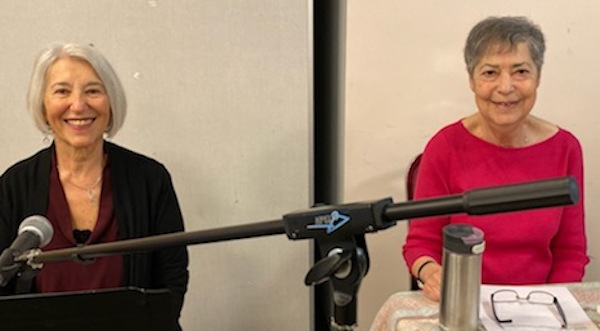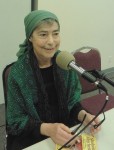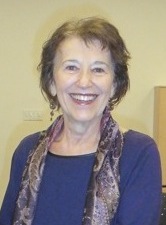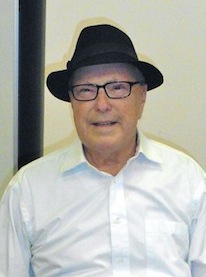From left: Leah Deslauriers, Devorah Goldberg, Lisa de Silva, Donna Cantor, Julie Hirschmanner and Charles Leibovitch, with Debbie Sharp in front. (photo by Karon Shear)
All of us fervently wish that, as the years gather, we will be able to gracefully embrace and be embraced by them. On Jan. 22, an overflow crowd at the Jewish Community Centre of Greater Vancouver Dayson Boardroom learned how to do just that.
Shanie Levin, Jewish Seniors Alliance of Greater Vancouver (JSA) coordinator of the event, called Aging in Place, welcomed everyone. Co-hosted with the JCC Seniors, the session – which was moderated by Donna Cantor, senior outreach counselor at Jewish Family Service Agency – featured a panel of experts on the subject.
The first to speak was Debbie Sharp, field supervisor for the United Way’s Better at Home program, which offers support by paid staff and unpaid volunteers for seniors 55 and older who want to remain at home while aging, with the ability and dignity to do so. The United Way offers programs that are funded by the B.C. government in up to 68 communities across the province, and can offer help in a range of non-medical services on a sliding fee scale. Some programs are even offered at no charge.
The specific services offered reflect the different needs of each community, explained Sharp. Among those offered are yard work, minor home repair, light housekeeping, grocery shopping, friendly visiting, snow shoveling, and transport to appointments. The program is intended to help seniors play an active role in their communities and continue living at home surrounded by family and friends.
The next panelist was Julie Hirschmanner, occupational therapist at Vancouver Coastal Health, who listed ways in which seniors can stay at home safely. VCH can provide the services of health-care providers such as nurses, physiotherapists, occupational therapists, and care managers to help with bathing. Hirschmanner recommended equipment that would make each step of aging easier – grab bars and raised toilet seats, for example – and general advice. In stressing that prevention is the best tool seniors themselves can use, she listed certain hazards we tend to overlook in prevention of falls: rushing to get things done, rising too quickly from a seated position, getting overtired, carrying too much in both hands so being unable to use rails, climbing onto furniture to reach for things, wearing slippers with no backs (hence, no support), dimly lit areas, incorrect or overuse of medication, and clutter in pathways or stairs. She also reminded attendees that people can call 911 if they have fallen and cannot get up, and highly recommended a medical-alert bracelet if one lives alone.
The JSA’s Charles Leibovitch spoke about the many important services offered by JSA peer support counseling graduates, who have passed an intensive 11-week training course. This program, initiated by JSA and set up by Leibovitch in 2011, offers peer counseling, in which trained individuals are matched up with clients requiring the service; friendly home visits, which involve a trained graduate visiting the home of a senior, usually one who is too frail to venture out on their own, and assisting them with shopping, light errands, banking or getting to medical appointments; Shalom Again friendly phone calls, where the loneliness and isolation of individuals is alleviated by someone keeping in touch with them on a daily, weekly, bimonthly or monthly basis. It is important to allow time for conversation, some socialization and perhaps even to encourage a slow reintroduction into community activities. These services are at no cost to the client receiving them.
There have been three graduating peer-counseling classes, with about 13-15 graduates in each. A new class is underway and there are 30 clients at present, with a waiting list. The clients are matched with the counselors, and followed up by Leibovitch and Lynne Moss, his assistant, after the initial introduction. The client also receives Leibovitch’s cellphone number to be used if anything urgent arises. Cantor remarked that she has met many happy clients of these match-ups.
Lisa de Silva, a private occupational therapist, spoke next. Her four staff offer the services required pre- and post-surgery, and can be booked as needed, and not on an ongoing basis, as this type of care can be quite costly – though it may be covered partially by Blue Cross or another insurance provider. De Silva and her staff also offer general at-home care services – and, between them, they speak four different languages, which may be helpful to non-native-English-speakers in times of stress.
The last presenter, Devorah Goldberg, is an interior designer. Specializing in design for seniors, she incorporates function and beauty, using ergonomics to ensure that each client has a home best suited to his or her needs. Her suggestions include cupboards built lower down, no gas stove, labeling items or color-coding them so they are easily identifiable, sensor lamps beside the bed, a large dial phone with numbers (and even the faces) of dear ones for speed dialing, grab bars in the bathtub and by the toilet, extra shelves to house toiletries within easy reach, and no soft sofas (as it is too difficult to stand up once seated).
JCC Seniors coordinator Leah Deslauriers, who contributed her wonderful sense of humor throughout the presentations, thanked the panelists and presented each of them with a token of appreciation on behalf of the organizers and attendees. Many questions were asked during the presentations, which showed the audience’s keen interest in the topics that were being discussed.
Binny Goldman is a member of the Jewish Seniors Alliance of Greater Vancouver board.





